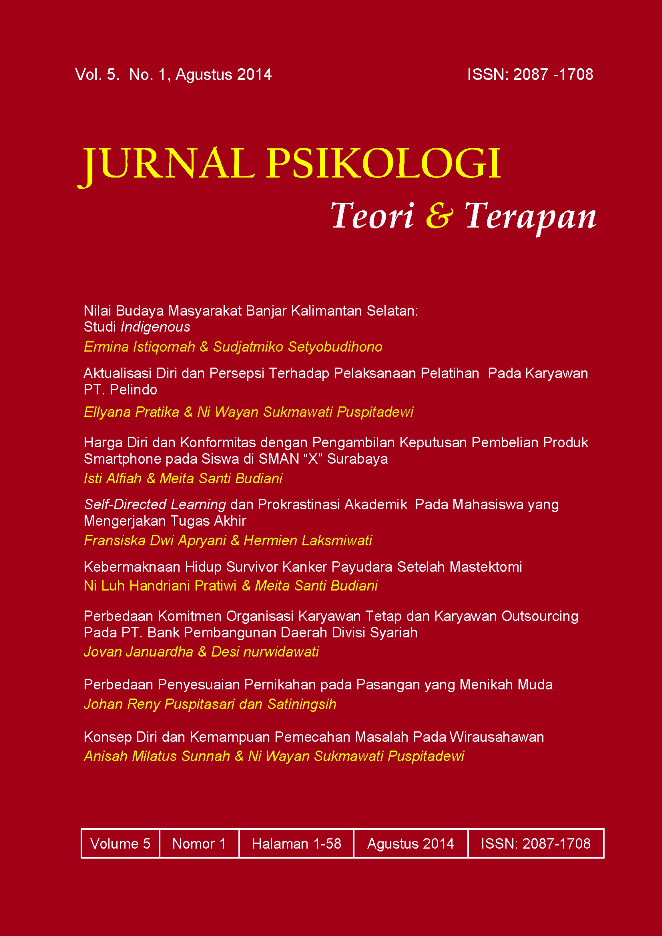Self-Directed Learning dan Prokrastinasi Akademik Pada Mahasiswa yang Mengerjakan Tugas Akhir
DOI:
https://doi.org/10.26740/jptt.v5n1.p23-29Keywords:
Prokrastinasi akademik, self-directed learning, tugas skripsiAbstract
This study aims to determine the relation between self-directed learning and academic procrastination in completing their thesis assignments among university students. The population were psychology students of Universitas Negeri Surabaya with sample of 41 students who were recruited randomly from the cohort of 2008, 2009, and 2010 years. Data collected using Likert model self-directed learning and academic procrastination scales. Self-directed learning scale consists of 53 items, with reliability of scale r=0,953.in addition, the academic procrastination thesis assignment scale consists of 53 item, with reliability of scale is r=0,960. Data were analyzed using product moment correlation technique. The result shows that the coefficient correlation was -0,618 in the significance value of 0,000 (p<0,05. The result means that there is a significant negative correlation between self-directed learning and academic procrastination in completing thesis assignment. The result indicates that the higher the self-directed learning participants have, the lower their academic procrastination would be and vice versa.
Abstrak: Penelitian ini bertujuan untuk mengetahui apakah terdapat hubungan yang signifikan antara self-directed in learning dengan prokrastinasi akademik tugas skripsi pada mahasiswa. Populasi penelitian ini adalah mahasiswa Psikologi Universitas Negeri Surabaya, dan sampel 41 siswa diambil dari angkatan 2008, 2009, dan 2010. Peneliti menggunakan dua skala Likert, yaitu skala self-directed in learning dan skala prokrastinasi akademik tugas skripsi. Skala self-directed in learning terdiri dari 53 aitem, dengan nilai reliabilitas sebesar r=0.953. Skala prokrastinasi akademik tugas skripsi terdiri dari 53 aitem, dengan nilai reliabilitas sebesar r=0.960. Analisis data pada penelitian ini menggunakan korelasi product moment. Hasil penelitian menunjukkan nilai koefisien korelasi sebesar -0618 dengan nilai signifikansi 0,000 (p <0,05), yang berarti terdapat hubungan negatif yang signifikan antara self-directed in learning dengan prokrastinasi akademik tugas skripsi,terutama pada mahasiswa Psikologi Universitas Negeri Surabaya. Hasil ini menunjukkan bahwa semakin tinggi self-directed in learning, semakin rendah prokrastinasi akademik tugas skripsi, dan sebaliknya semakin rendah self-directed in learning, semakin tinggi prokrastinasi akademik tugas skripsi.
References
Almira, R. U. (2013). Tipologi Prokrastinasi Akademik dalam Menyusun Skripsi Studi Kasus Mahasiswa Semester Terakhir Prodi Psikologi UIN Sunan Kalijaga. Skripsi, tidak diterbitkan, Yogyakarta: Fakultas Ilmu Sosial dan Humaniora Universitas Islam Negeri Sunan Kalijaga.
Azwar, S. (1996). Tes Prestasi - Fungsi Pengembangan Pengukuran Prestasi Belajar. Yogyakarta: Pustaka Pelajar Offset.
Erde, W. V. (2003). A Meta-Analytically Derived Nomological Network of Procrastination. Personality and Individual Differences, 1401-1418. Diakses Juni 6, 2013, dari http://www.researchgate.net
Hasan, I. M. (2002). Pokok-pokok Materi Metodologi Penelitian dan Aplikasinya. Bogor: Ghalia Indonesia.
Nurhayati, E. (2011). Psikologi Pendidikan Inovatif. Yogyakarta: Pustaka Belajar.
Onji, K., & Kikuchi, R. (2011). Procrastination, Prompts, and Preferences: Evidence dari Daily Records of Self-Directed Learning Activities. The Journal of Socio-Economics 40(6), 929-941. Diakses Januari 27, 2014, dari http://papers.ssrn.com
Prawitasari, J. E. (2012). Psikologi Terapan - Melintas Batas Disiplin Ilmu. Jakarta: Erlangga.
Rumiani. (2006). Prokrastinasi Akademik Ditinjau dari Motivasi Berprestasi dan Stress Mahasiswa. Jurnal Psikologi Universitas Diponegoro, 3(2), 37-48. Diakses Februari 15, 2014, dari http://ejournal.undip.ac.id
Solomon, L. J., & Rothblum, E. D. (1984). Academic Procrastination: Frequency and Cognitive-Behavioral Correlates (online). Journal of Counseling Psychology, 31, 503-509, Diakses Juni 6, 2013, dari http://www-rohan.sdsu.edu
Sugiyono. (2011). Metode Penelitian Kuantitatif, Kualitatif dan R&D. Bandung: Alfabeta.
Suryabrata, S. (2000). Pengembangan Alat Ukur Psikologis. Yogyakarta: Penerbit Andi.
Downloads
Published
How to Cite
Issue
Section
License
Authors who publish in this journal agree to the following terms:
Copyright in any article is held by the author.
The author grants the journal, publication rights with the work simultaneously licensed under a Creative Commons Attribution License that allows others to share the work with an acknowledgment of the work's authorship and initial publication in this journal.
Authors may enter into separate, additional contractual arrangements for the non-exclusive distribution of the journal's published version of the work (e.g., posting it to an institutional repository or publishing it in a book), with an acknowledgment of its initial publication in this journal.
Authors are permitted and encouraged to post their work online (e.g., in an institutional repository or on their website) prior to and during the submission process, as this can lead to productive exchanges, as well as earlier and greater citation of published work.
 Abstract views: 1766
,
Abstract views: 1766
, PDF Downloads: 1370
PDF Downloads: 1370


















